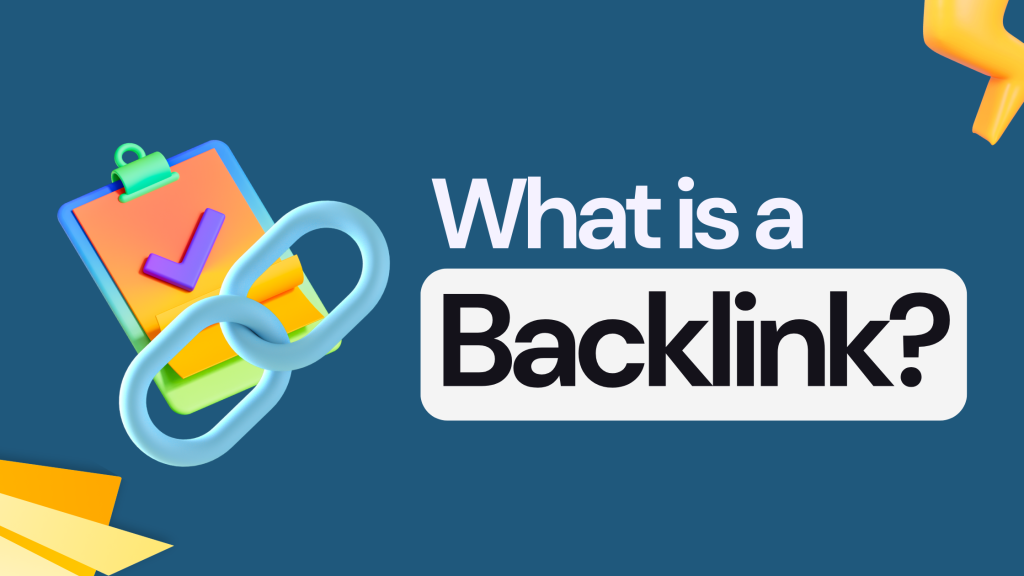Have you ever wondered why some websites seem to dominate search results while others struggle to get noticed? The secret might be hiding in plain sight – backlinks.
At our company, we’ve seen firsthand how powerful backlinks can be. They’re like the popular kids in high school – everyone wants to be associated with them, and their influence can make or break your reputation.
But what exactly is a backlink? Let’s dive in and unravel this crucial element of SEO.
What is a Backlink?
A backlink, also known as an inbound link or incoming link, is simply a link from one website to another. Say you posted an amazing tutorial on how to make pizza dough at home, and if someone provides a link to that tutorial from their website for others to find and read it, that’s an incoming link to your website from someone else’s website, and that’s what we call it as “Backlink”.
It’s like a vote of confidence in the digital world. When a reputable website links to your content, it’s essentially telling search engines, “Hey, this page is worth checking out!”
Imagine you’re at a party, and the most popular person there introduces you to everyone. Suddenly, you’re no longer a stranger – you’re someone worth knowing. That’s what a high-quality backlink does for your website in the eyes of search engines.
Why Are Backlinks Important?
Backlinks are the backbone of SEO. They serve several crucial functions:
- Boost Search Engine Rankings: Search engines like Google use backlinks as a key factor in determining a website’s authority and relevance.
- Drive Referral Traffic: Quality backlinks can send a steady stream of targeted visitors to your site.
- Build Brand Authority: When reputable sites link to you, it enhances your credibility in your industry.
In fact, our analysis of over 1 million search results found that the number of domains linking to a page correlated with rankings more than any other factor.
Types of Backlinks
Not all backlinks are created equal. Let’s break down the different types:
1. Dofollow Links
These are the gold standard of backlinks. Dofollow links pass along “link juice,” which is SEO speak for the authority and ranking power of the linking site. They’re like a strong handshake and a glowing recommendation rolled into one.
When you provide a do-follow link to other people’s websites, when Google comes to fetch your website data, it will follow along, go to the linked website, and index it, too.
2. Nofollow Links
Nofollow links include a rel=”nofollow” in the HREF tag, which tells search engines not to count the link as an endorsement. While they don’t directly boost your search rankings, they can still drive traffic and add diversity to your link profile when received for your website.
When you give a No-Follow link to other websites from your website, you’re asking Google not to follow along and index their page, or at least you’re saying that this website is just a stranger’s website and you’re asking Google not to consider it as an endorsement.
No-follow links are usually used in user-generated content where the website has no control over the posted content – so yes, whenever you link yourself from Quora, it is usually no-follow link.
It is not that no-follow links are worthless; they are just not as worthy as do-follow links where there is trust involved, and for Google, it does really matter.
The Anatomy of a Quality Backlink
What makes a backlink valuable? Here are the key components:
- Relevance: The linking site should be related to your industry or niche.
- Authority: Links from high-authority sites carry more weight.
- Placement: Links within the main content are more valuable than those in footers or sidebars.
- Anchor Text: The clickable text of the link should be relevant and descriptive.
Think of backlinks like recommendations for a job. A glowing reference from a respected industry leader will carry far more weight than a lukewarm nod from an unrelated acquaintance.
Strategies for Building Quality Backlinks
Building a strong backlink profile takes time and effort, but it’s worth it. Here are some strategies we’ve found effective:
Create Link-Worthy Content
The foundation of any good backlink strategy is exceptional content. Create resources that others in your industry will want to reference and share.
Guest Blogging
Contribute high-quality articles to reputable sites in your niche. This not only gets you backlinks but also helps establish you as an authority in your field.
Broken Link Building
Find broken links on other websites and offer your content as a replacement. It’s a win-win – you get a backlink, and they fix a broken link on their site.
Skyscraper Technique
Find popular content in your niche, create something even better, and then reach out to sites linking to the original content.
The Shortcut: Should You Buy Backlinks?
Now, here’s where things get a bit tricky. You might be tempted to take a shortcut and buy backlinks. After all, if backlinks are so valuable, why not just purchase them in thousands for $5 from Fiverr?
Here’s the stark truth: buying backlinks is against Google’s Webmaster Guidelines and can result in severe penalties, including having your site removed from search results entirely.
It’s like trying to bribe the referee in a sports match. You might get away with it for a while, but when you’re caught (and you will be), the consequences are severe and long-lasting.
And the thing is, Google knows. With all of their sophisticated technology, years of AI training and experience in dealing with hundreds of thousands of websites since the internet started in the late ’90s, getting away after purchasing links will not happen.
Instead of buying backlinks, focus on earning them through high-quality content and genuine relationship-building within your industry. Being honest is worth it. So be honest and give maximum value to the readers who are investing their valuable time into your article. Links will follow automatically.
Monitoring Your Backlink Profile
Building backlinks is only half the battle. You also need to monitor your backlink profile regularly. Here’s why:
- Identify toxic backlinks that could harm your SEO
- Discover new link-building opportunities
- Track your progress and the success of your link-building efforts
Tools like Ahrefs, SEMrush, and Moz offer comprehensive backlink analysis features that can help you keep your finger on the pulse of your backlink health.
Why are we identifying Toxic Backlinks?
Sometimes, when our website is doing so well and receiving tons of traffic, it may make our competitors jealous. After all, they don’t know how much effort we’re putting into creating such a masterpiece and may compare it with a low-quality article generated by an AI.
So, such jealous competitors may buy links on our behalf on Fiverr to make us look bad in the eyes of Google, hoping that we will get punished so that their content outranks ours.
When we keep a closer look at our backlinks, we can know whenever someone is trying to do this, and we can say to Google – we didn’t do it!
While I would very much like to walk you through the complete process, it is so much of a large process to cover in this article and would derail this post completely.
Here’s a wonderful post (along with a video) by Majestic on how to create a file for disavowing bad links in Google Search Console, so it might be worth a read if you’re really interested in learning how to tell Google that we did not buy those links if hypothetically a competitor did that to your website.
And where were we again? Oh, and…
The Future of Backlinks
As search engines become more sophisticated, the nature of backlinks continues to evolve. However, one thing remains constant: quality will always trump quantity.
We predict that in the coming years, the relevance and context of backlinks will become even more critical. Search engines will get better at understanding the relationship between linked content, making it more important than ever to focus on building relevant, high-quality backlinks.
Conclusion: The Power of Patience and Persistence
Building a strong backlink profile is a marathon, not a sprint. It requires patience, persistence, and a commitment to creating valuable content that others want to link to.
Remember, every high-quality backlink you earn is a step towards better search rankings, increased traffic, and greater authority in your niche. So, roll up your sleeves and start building those relationships and creating that link-worthy content.
The journey of a thousand clicks begins with a single backlink. Are you ready to take that first step?

